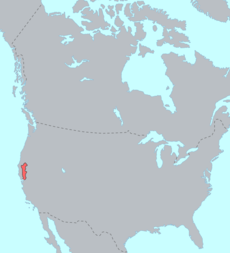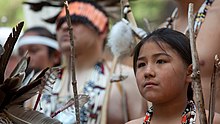Wintun
 Pre-contact distribution of Wintun peoples | |
| Total population | |
|---|---|
| 2,500[1] | |
| Regions with significant populations | |
| Languages | |
| English, Wintun languages | |
| Religion | |
| Roundhouse religion, Christianity |
The Wintun are members of several related Native American peoples of Northern California, including the Wintu (northern), Nomlaki (central), and Patwin (southern).[2][3] Their range is from approximately present-day Lake Shasta to San Francisco Bay, along the western side of the Sacramento River to the Coast Range. Each of these tribes speak one of the Wintuan languages. Linguistic and archaeological evidence suggests that the Wintun people probably entered the California area around 500 AD from what is now southern Oregon, introducing bow and arrow technology to the region (Golla 2011: 205). There has been carbon dating of several artifacts by UC Berkeley that dates back to around 10,000 years, and several of these artifacts have now been repatriated. Despite being a major influence on the region's history, there is still very little history on the Wintu due to centuries of genocide and displacement that still occur today along with continued destruction of sacred ceremonial and religious sites, often due to companies that ignore legal or ethical considerations.

Federally recognized Wintun tribes
- Cachil DeHe Band of Wintun Indians of the Colusa Indian Community of the Colusa Rancheria
- Grindstone Indian Rancheria of Wintun-Wailaki Indians
- Kletsel Dehe Wintun Nation, formerly known as the Cortina Indian Rancheria
- Paskenta Band of Nomlaki Indians
- Redding Rancheria
- Round Valley Indian Tribes of the Round Valley Reservation
- Yocha Dehe Wintun Nation, formerly known as the Rumsey Indian Rancheria of Wintun Indians[4][5][6]
See also
Notes
- ^ California Indians and Their Reservations: P. San Diego State University Library and Information Access. 2010 (retrieved 30 June 2010)
- ^ Pritzker, 152
- ^ California Indians and Their Reservations: W. San Diego State University Library and Information Access. 2010 (retrieved 30 June 2010)
- ^ "Home". yochadehe.org.
- ^ Pritzker, 154
- ^ "Wintun Indians." Archived 2013-09-30 at the Wayback Machine SDSU: California Indians and Their Reservations. 2011. Retrieved 25 Oct 2012.
References
Further reading
- Goddard, Ives. 1996. "The Classification of the Native Languages of North America." In Languages, Ives Goddard, ed., pp. 290–324. Handbook of North American Indians Vol. 17, W. C. Sturtevant, general ed. Washington, D.C.: Smithsonian Institution. ISBN 0-16-048774-9.
- Liedtke, Stefan. 2007. The Relationship of Wintuan to Plateau Penutian. LINCOM studies in Native American linguistics, 55. Muenchen: Lincom Europa. ISBN 978-3-89586-357-8
- Shipley, William F. 1978. "Native Languages of California." In California, Robert F. Heizer, ed., pp. 80–90. Handbook of North American Indians Vol. 8, W. C. Sturtevant, general ed. Washington, D.C.: Smithsonian Institution. ISBN 0-16-048774-9.
- Washington, F. B. 1989. Notes on the Northern Wintun Indians. Berkeley, Calif.: California Indian Library Collections Project [distributor].
- Whistler, Kenneth W. 1977. "Wintun Prehistory: An Interpretation based on Linguistic Reconstruction of Plant and Animal Nomenclature." Proceedings of the Third Annual Meeting of the Berkeley Linguistics Society, February 19–21. pp. 157–174. Berkeley.
External links
- Siskiyous.edu: Wintu peoples Archived 2005-08-27 at the Wayback Machine
- Native Tribes, Groups, Language Families and Dialects of California in 1770 (map after Kroeber)
